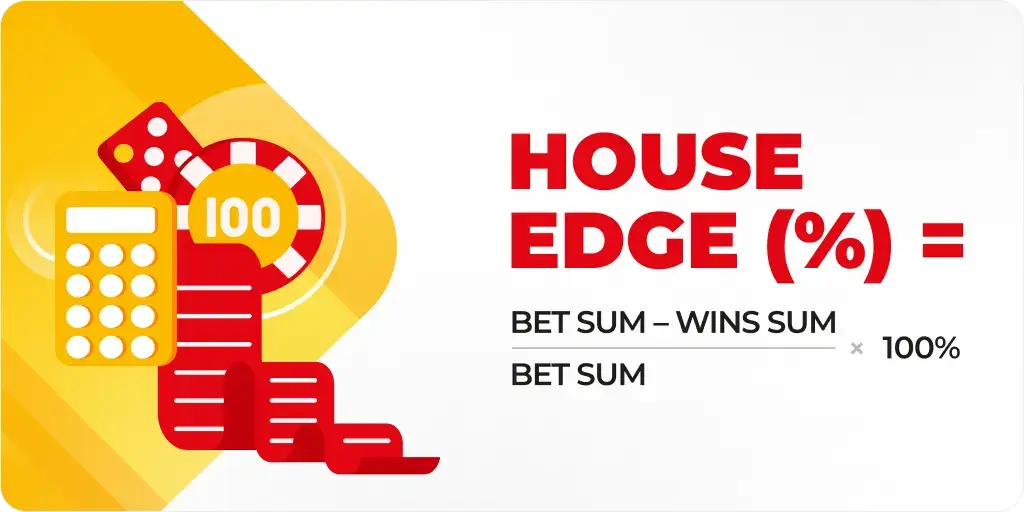In short, House Edge – also known as ‘House Advantage’ or ‘Casino Edge’ – is the invisible force that shapes the odds, influences your winnings (or losses), and stands as a major cornerstone of any online casino or sportsbook operator’s overall financial strategy.
Whether you’re a seasoned player looking for the best possible chances, or a savvy operator aiming for long-term success, understanding House Edge is crucial. In this article, we’ll walk you through the concept of House Edge, shedding light on its significance, and its application in iGaming.
Understanding House Edge in iGaming
At its core, the House Edge represents the mathematical advantage that gambling games have over the players. From the operators’ perspective, this ensures their casino and sportsbook operations remain profitable in the long run.
Tracing its roots back to early forms of gambling, the built-in concept of House Edge recognises that all games must be slightly tilted in favour of the ‘house’ to cover costs and turn a profit. It’s the main reason why, despite players’ lucky streaks, the house has a mathematical edge over time.
What is House Edge and Why Does It Matter?
As touched on above, House Edge, in essence, is the built-in advantage casinos and sportsbooks hold over players. However, it’s important to realise that the concept of House Edge isn’t about ‘rigging’ games or ‘cheating’ players out of potential wins.
Here’s how House Edge applies to online casinos and sportsbooks:
- House Edge in Casino Games: For games like slots, roulette, or blackjack, the House Edge is a percentage built into the very rules of the game. It represents the average amount a player can expect to lose compared to their original bet over an extended period.
For example, a slots House Edge of 4% means that over the long term, the player can expect to lose an average of €4 for every €100 wagered.
- House Edge in Sports Betting: Sportsbooks set odds that incorporate a House Edge known as ‘vigorish’, ‘the vig’, or ‘juice’, a fee charged by a bookmaker for accepting a wager. This ensures that no matter which team wins, the sportsbook can still make a profit.
For example, let’s say the sportsbook offers odds of 1.90 for a team to win. This means a successful €100 bet would pay out €190 (your original stake plus €90 in winnings). However, based on the teams’ strengths, the ‘fair’ odds might be closer to 1.85. This difference (the sports betting vigorish or juice) represents the sportsbook’s built-in House Edge of around 2.6%.
- House Edge in Poker: In poker rooms, both online and in land-based casinos, the House Edge takes the form of a ‘rake’, a commission fee taken by the house per pot or per hand depending on the stakes and the type of game. This fee is usually a percentage of the pot or a sliding scale commission capped at a maximum amount.
For example, a typical rake might be 5% of the pot up to a maximum of €5. This rake ensures that the poker room profits regardless of which player wins, helping to cover operational costs and help generate revenue.
House Edge in iGaming Explained: Strategies, Insights, and FAQs | SOFTSWISSCalculating House Edge: Understanding the Numbers
The calculation of House Edge might seem overly complex, but it basically boils down to the relationship between the probability of winning and the payout ratio.
For example, if flipping a coin was a game offered by an online casino, a 50% chance of winning would suggest an even House Edge. However, if a game’s payout is less than what would be expected based on the odds of winning, then the difference between the expected payout and the actual payout represents the House Edge.
To put this into an iGaming perspective, let’s consider a simplified roulette example:
- You bet €1 on a single number in European Roulette (which has 37 pockets).
- Your chance of winning is 1/37, or 0.027.
- The house’s expected profit on this bet is roughly €0.027
- House Edge for this bet = (€0.027 / €1) x 100 = 2.7%

To calculate the House Edge, you subtract the total winnings of players from their total bets, and then divide the result by the total bets. Multiply this by 100 to express it as a percentage. This then shows the portion of the bets that the ‘house’ keeps as profit on average.
Now, before diving any deeper into complex calculations, it’s essential to differentiate between House Edge and its counterpoint, the Return to Player (RTP) rate, as both concepts play key roles in iGaming.

